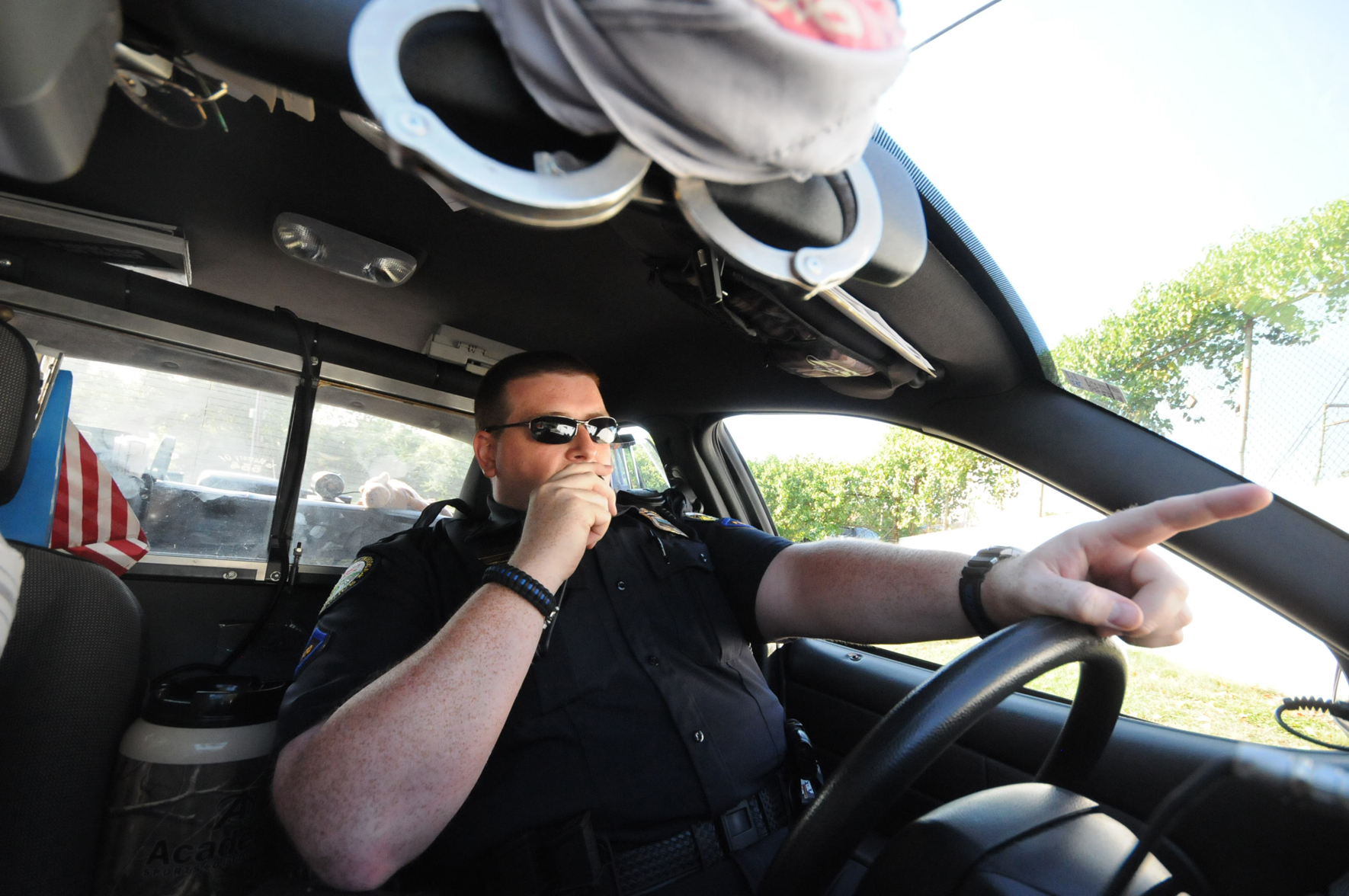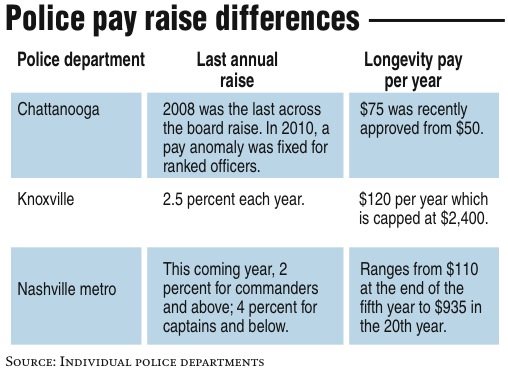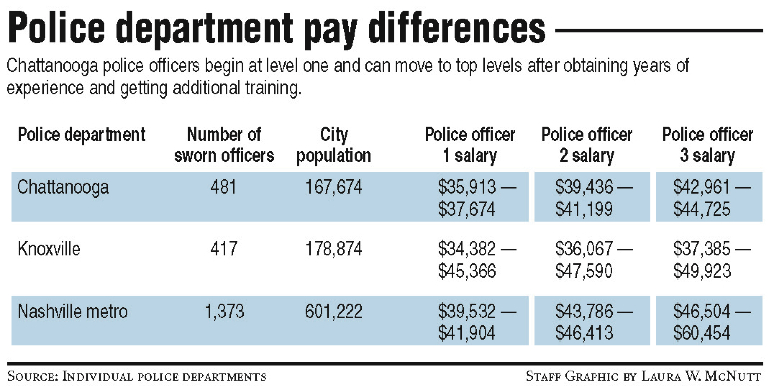Chattanooga police frustrated by wait for career development compensation
Sunday, January 1, 1905
Just shy of having five years of police work under his belt, Chattanooga police Officer Kyle Moses has seen a lot.
He watched a woman die in a car collision. At the wreck, he carried the unconscious body of a little boy wearing the same Thomas the Tank Engine shirt that Moses' son was wearing that morning when he left home.
He works in the public housing complexes, where residents call the 28-year-old officer Big Fluffy because of his tall, barrel-chested frame.
Under city classifications, Moses, a training officer, is ranked as a level two patrol officer. He already has taken the required classes to be listed as a level three, but he still is paid as a starting officer, earning a salary similar to those of the rookie officers he trains. He received his promotion more than a year ago without pay.
He is one of 130 low-ranking Chattanooga officers who will be affected if the City Council votes tonight not to give $1.3 million to the police department's career development plan.
"It's kind of discouraging. ... I've worked so hard for it, and a lot of it I've had to do at my own expense," Moses said. "Am I going to be able to reap the benefits? They told me, 'Do this and this and this, and you'll be able to increase pay.' And I've done this and this -- plus more. I still haven't received it.
"I receive pats on the back from my family, but pats on the back doesn't pay the bills. Pats on the back doesn't buy my kid a bicycle. Pats on the back doesn't keep the water and lights on. While everything else is going up, I haven't seen anything else coming in."
In last Tuesday's council meeting, members were divided on the issue. Some said they wanted across-the-board raises for all city employees, including police officers. Others said they think the proposed salary increases are too high.
Civilian city employees, not including police officers and firefighters, are expected to receive raises this year, pending the council's approval.
Started in 2008, the Police Officer Career Development program was designed to train patrol officers and allow them the chance for advancement and salary increases in a department where not everyone climbs the ranks. Those who do make rank as sergeant or above often stay in their jobs for decades until retirement, creating little room for upward movement for lower-ranking officers.
In 2011, there were no promotions in patrol. In 2012, nine sergeants, one lieutenant and one captain were promoted in the department where 481 officers work, records show.
In order to move from levels one through three and then to the title of "master patrol officer," officers must have a number of years of service with the department and the required number of hours of training. Level three officers must have at least five years of experience, while master patrol officers must have at least a decade of experience, according to the policy.
The demand for the career development program, which already has had as many as 240 officers who took advantage of the training, was unprecedented, officials said.
Officers like Moses, who receive a promotion below the rank of sergeant, sometimes wait more than a year to have their pay catch up. The city doesn't compensate them immediately as it does with firefighters, who have a similar career development system in place.
"The fire department has been doing this for a number of years. It's smooth," said Chattanooga Personnel Director Donna Kelley. "Like anything else that's new, you struggle with change. When [Former police Chief] Freeman Cooper first began this, 15 officers took advantage of it. There were a lot of naysayers. When those 15 officers began to move, it got the attention of other officers."
Kelley said the demand for the police program was unpredictable. Coupled with the downturn in the economy, installment of the program slowed because of financial constraints, she said.
"Last year, the chief recognized there were another 70-something people [who wanted to enroll in the program]. So it hit all of us. The budget had already been planned. The budget had already been set from one set of numbers and then a new set of numbers came in. So, we're trying to accommodate that unknown factor," she said.
DEALING WITH UNKNOWNS
For Moses, a former Church of Christ preacher, his family also deals with unknowns. He works three extra jobs providing security for housing projects and businesses. His wife and 3-year-old son live in a modest home. The couple is still paying off their student loans and has a mortgage payment. They are first-time homeowners.
"I didn't grow up thinking I wanted to be a cop. I always wanted to be a preacher," he said.
Moses' father, Ken, retired as a Chattanooga Fire Department captain after 29 years, so Moses knew not to expect lots of money by becoming a police officer.
"He ran into burning buildings and pulled children and pets out. He cut people out of cars and held people's hands when they died, saying their last prayers with them. And I've been very proud of him and his accomplishments," Moses said. "I want my son to feel the same way about me.
"It's not a raise that I should be getting; it's promotional pay," Moses said. "Each rank comes with more responsibility. Each rank comes with more duties you have to fulfill."
Sgt. Craig Joel, first vice president of the Fraternal Order of Police Lodge No. 22, said many of the affected officers are disappointed at the possibility that the $1.3 million for the career program won't be approved.
"People can't imagine the frustration of the officers and their families because this isn't a raise. This is money they have qualified for under the mayor's plan and simply never received," he said. "It adds insults to injury. Not have they not only earned it and been denied it, now it's been held over their heads again."
Officer Josh Wright, 32, who has a newborn son and new home in a subdivision, is at level two but still gets paid as a level one. Like Moses, he has been waiting a year to receive the raise after meeting requirements.
"It affects home life and department morale," he said. "We don't want to make like police are the only ones with problems. We're blessed. I do a job I love."
But sometimes, the definition of raise is debated.
"The important point is, what do you consider a pay raise? Because by installing the career ladder, people can determine their own pay raises," Mayor Ron Littlefield said.
After the city recently was criticized by Joel for not paying officers enough, Littlefield questioned if officers were happy with the career development system and suggested an assessment may be needed.
"If that's not working and that's the feeling of the department, let's look at it again," he said. "There are other ways we can compensate policemen. We do believe that pay ranges and pay levels are comparable [to elsewhere] or better, particularly when you add in the pension."
"No one takes issue with the fact that firemen and policemen have dangerous jobs. They do. No one takes issue with the fact that they deserve what they get in benefits and pay," Littlefield said.
Kelley said she hopes to catch up the backlog of promoted officers' salaries as well as new promotions as they are made.
"I fully intend to do that this year," she said.
For officers like Moses, they will wait and see.
"When people call the police, they call police because they don't have anywhere else to turn. So we're a last resort," he said. "I feel like sometimes politicians see us as a last resort, and they treat us that same way."


